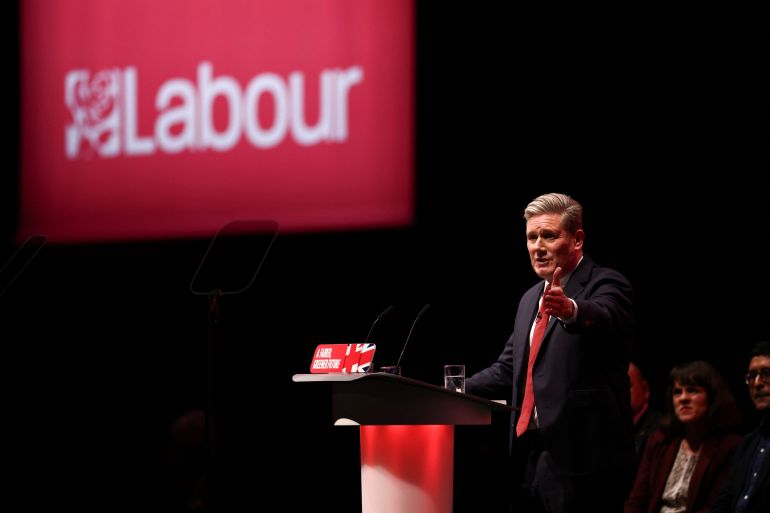Could the Labour Party win a British election?
Polls suggest Liz Truss, the UK’s new Conservative prime minister, is far from popular with the British public, while Labour enjoys a boost.

London, United Kingdom – “I want what you want,” British Prime Minister Liz Truss said on Wednesday in an impassioned speech at the Conservative Party conference, promising “growth, growth, growth” to fix the economy.
But the PM and the public appear to be at odds.
Keep reading
list of 4 items‘A Labour moment’: UK opposition leader sets out pitch for power
UK government makes tax cut U-turn after market turmoil
IMF warns UK its budget cuts will ‘likely increase inequality’
While Truss doubles down on her economic agenda – she used the word “growth” 29 times in the speech – some seem keen on not only her removal from office, but also an end to 12 successive years of Conservative Party rule.
“There are about as many people in Britain who think the Moon landings were faked as there are that think that the government is currently doing a good job,” Chris Curtis, head of political polling at market research firm Opinium, told Al Jazeera.
“They’re no longer seen as the party that’s competent, and they’re no longer seen as the party that’s good at running the economy,” Curtis said.
Following a botched mini-budget delivered late last month, opinion polls put the right-wing Conservatives at 22 percent – and possibly as much as 33 percent – behind the main opposition Labour Party in national voting intention figures.
Chancellor Kwasi Kwarteng’s heavily criticised plan, which plummeted the pound, included a tax cut for high earners during a cost of living crisis and provoked a crisis of confidence among investors.
The polls also suggest Truss is already less popular than her scandal-hit predecessor, Boris Johnson; nearly three-quarters of Britons have an “unfavourable” opinion of her, according to a recent YouGov survey.
The 47-year-old assumed office on September 6 following a leadership contest decided by 140,000 Conservative Party members – a tiny segment of the UK’s overall population.
Most Britons – and Tory voters – have an unfavourable opinion of Liz Truss (fieldwork 1-2 October)
All Britons
Favourable: 14% (-12 from 21-22 Sep)
Unfavourable: 73% (+16)Con voters:
Favourable: 30% (-25)
Unfavourable: 60% (+28)https://t.co/28mDtcnwSO pic.twitter.com/XncwvbKjat— YouGov (@YouGov) October 5, 2022
Labour has ‘done half the job’
The Conservatives’ recent struggles have provided Labour an opportunity.
Under leader Keir Starmer, the party has pitched itself as a competent, disciplined government in waiting and moved to reoccupy the centre ground of British politics.
The 60-year-old has promised, if elected, to fix the country’s ailing economy, revitalise the National Health Service (NHS) and tackle climate change.
His plans include creating a publicly owned renewable energy company to transform the UK into a “green growth superpower”, boosting home ownership and controlling immigration using a points-based system.
Simon Usherwood, a professor of politics at The Open University, said Starmer had successfully positioned Labour as “sensible” as the Conservatives flip-flop on policy and fight among themselves.
“It’s not a hugely charismatic lineup from Starmer down, but it’s people who … know the detail, are thoughtful in their interventions and look responsible,” Usherwood told Al Jazeera.
While the Conservatives’ favourability ratings languish at a lowly 20 percent, according to recent polling, 44 percent of voters have a “very” or “somewhat” favourable opinion of Labour, up seven points from just before the government’s mini-budget on September 23.
But Usherwood cautioned Labour has done only “half the job”.
“With the Conservatives in self-destruct mode, in many ways, it is easy to look good. But I think where Labour have still struggled is selling a strong vision to the public,” he said.
“And as we get closer to a general election, Starmer is going to have to sell something more exciting than, ‘We are not the Tories’ or ‘We know what’s needed to sort out problems’.”
Truss ‘betting everything on growth’
The UK’s next general election is widely expected to take place in late 2024, and must by law be held by January 2025 at the latest.
This window affords Truss an opportunity to claw back support for the Conservatives – if she can avoid being deposed.
Her strategy is clear.
Alongside Kwarteng, her longtime ally, she will pursue reforms aimed at kickstarting economic growth, including rolling back regulations, overhauling planning laws and implementing billions of pounds worth of tax cuts.
In her words, the push confronts the “vested interests” of a sweeping “anti-growth coalition” that includes opposition parties, climate protesters, trade unions and “Brexit deniers”.
However, her plan represents a huge political gamble.
Truss may yet struggle to get a parliamentary sign-off for her agenda, much of which is unpopular, leaving her envisioned race for an economic upswing stuck at the starting gate.
Even if she can navigate the politics, the plan must pay off with clear growth, or she risks the wrath of voters already struggling to make ends meet.
“Truss is betting everything on the idea that there will be enough economic growth between now and the next election that she can take credit for,” Curtis said.
“And if there is, maybe she can turn around these really dramatic, rough [opinion polling] numbers, but I think at this stage, Labour winning the next election is by quite some distance, the most likely option.”
But Usherwood said talk of the Conservatives’ demise may be premature.
“The growth in support for Labour has been very rapid, which suggests it is not necessarily very deep,” he said.
“And if Truss is able to ride out the problems that she’s facing right now, she will have time to try and rebuild some support.
“So I think there is road still left to run on this, and that Labour, as much as they look in a strong position, are not in an unbeatable position.”